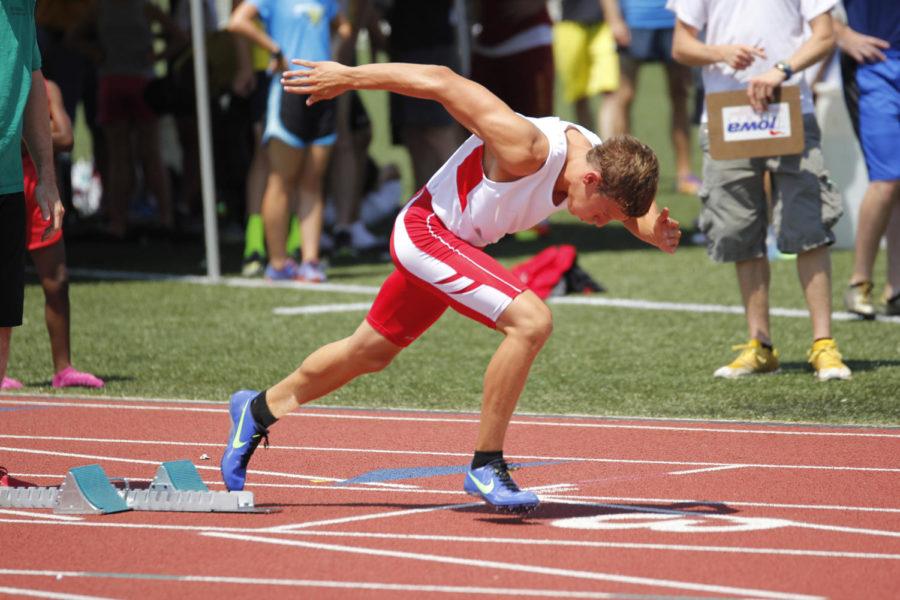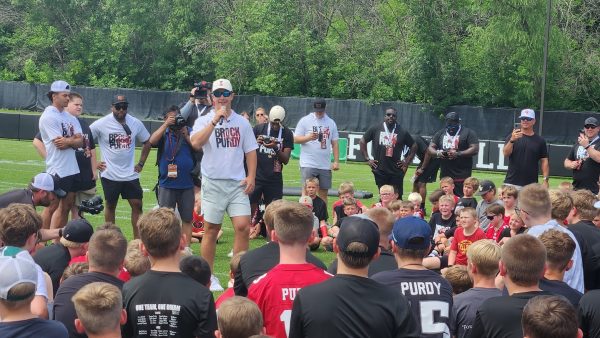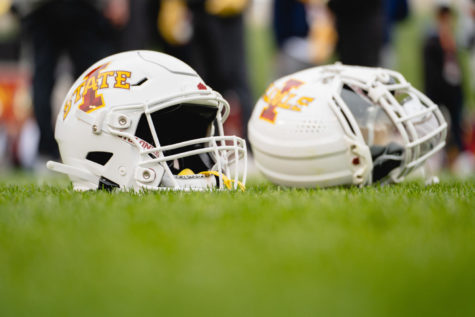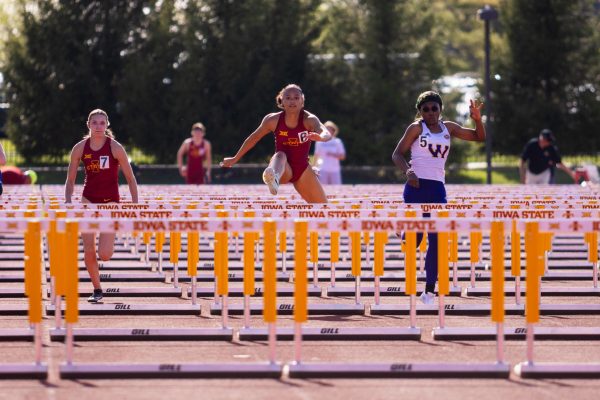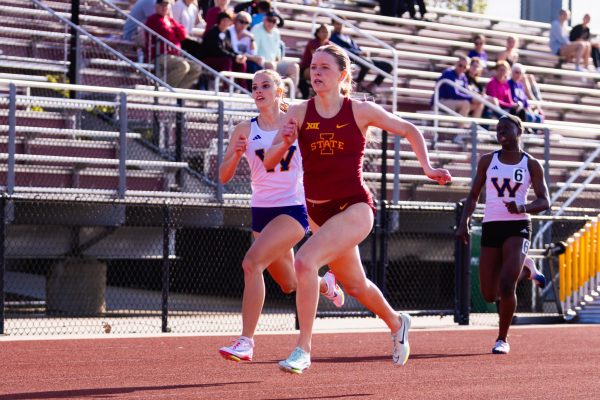Off to the races: Athletes from around the state gather for 28th annual Iowa Games
Photo: Jonathan Krueger/Iowa Sta
A runner takes off in the boys 400-meter race during the Iowa Games track and field event on July 20, 2013, at the Cyclones Sports Complex.
July 16, 2014
The fire of competition will burn brightly in Ames this weekend when the Iowa Games lights its cauldron July 18, signaling the start of the Iowa-based sporting event.
“The Iowa Games is set apart from your normal sporting events because typically those are [one-sport affairs],” said Cory Kennedy, marketing and communications director of the Iowa Games. “This is truly an Olympic style sports festival with our opening ceremonies and the number of sports that are being contested in the same facilities.”
The opening ceremonies will be in Jack Trice Stadium at 7:45 p.m. July 18 and will feature a parade of athletes, the lighting of the cauldron and keynote speaker Harrison Barnes, former Ames High School basketball standout and current Golden State Warrior.
Admission is free to athletes and coaches. Spectators aged 13 or older will be charged $5 for admission while admission for those 12 and younger is $2. All proceeds from the opening ceremonies will be donated to the Iowa Food Bank.
An athlete jamboree will precede the opening festivities and will be located on the east side of Jack Trice Stadium. It will take place from 5:30 p.m. to 7:30 p.m. and will feature games and entertainment, as well as an autograph signing session with Barnes, Kennedy said.
What follows the opening night’s proceedings will be the bulk of the 28th annual Iowa Games, which will have 61 different sports featuring 13,000 to 14,000 Iowa athletes ranging in age from four to 90 years old.
Kennedy said that the Iowa Games, which is part of the Iowa Sports Foundation — which also includes the Iowa Senior Games, Live Healthy Iowa and Adaptive Sports Iowa programs — can trace its roots back to 1987 when Gov. Terry Branstad saw other state games popping up around the country and decided to get Iowa in on the action.
During the Iowa Games’ inaugural year, there were 16 sports featuring roughly 7,000 athletes. Based on the 2014 numbers, the Iowa Games have grown substantially in subsequent years in both the sports offered and the number of overall participants.
Ames was the location Branstad chose for the event, and Ames is where it has remained for nearly three decades.
“Ames was chosen, I think, because of the facilities at Iowa State,” Kennedy said. “It was really kind of a showcasing of one of the state’s large universities and it was a great venue for all the sports to take place.”
The Iowa Games have grown too large to be contained in only one city — or even in one weekend for that matter, as they officially opened July 12 with ultimate frisbee and billiards — but the bulk of the events still take place on and around Iowa State’s campus.
“The majority of sports still take place in Ames and that is what makes the event unique. It still has that Olympic-style feel to it,” Kennedy said. “You can come to Ames during our main weekend and see anything from archery to wrestling … to pickleball to soccer, so you get to see a wide variety.”
Kennedy said most of the heavy traffic will center around State Gym, Beyer Hall, Lied Recreation Athletic Center, the Southeast Athletic Complex and Hunziker Youth Sports Complex.
Nearly all of the events are run primarily by volunteers who Kennedy said are the engines behind the Iowa Games.
“The Iowa Games staff has really five [people] dedicated to it, plus five interns,” Kennedy said. “The remaining workers are volunteers. We could not do it without the help of the volunteers in the Ames community.”
Kennedy said that typically there are between 2,500 and 3,000 volunteers over the course of the Iowa Games.
Two such volunteers are Anne Kohler and Janet Wildeboer, residents of Ames who work together as registered nurses in the pediatrics department of McFarland Clinic. The two women have volunteered as medical staff for the Iowa Games for what they described as “roughly the last 20 years.”
“It is fun. It is a good exposure for the community and we have a good time,” Wildeboer said. “We always have stories to tell … and we always look forward to volunteering together.”
That community spirit makes its way into the competitions themselves, which has brightened the experience for at least one competitor.
“I think it is the funnest tournament of the year because no one is out there trying to be super competitive,” said 19-year-old Jaden Van Dike of West Des Moines, a student at South Dakota who traveled home to participate in his second consecutive Iowa Games in ultimate frisbee July 12. “Everyone is pretty good, but no one is being a jerk about it, unlike if you were to play at a college tournament during the year.”
The event prides itself on being competitive but also inclusive, according to Randy Rogers, the commissioner of ultimate frisbee.
“There is a wide range of abilities, so by the end of pool play, people usually play themselves to the right level of competition,” Rogers said. “It is a good first tournament for people who have not done tournaments before.”
Soccer is the Iowa Games’ biggest event, boasting roughly 2,000 athletes on 150 different teams. However, the Iowa Games are not just for the players.
“One of the good spectator events is the strongman competition, which is similar to what you would see on ESPN with people pulling trucks and tires and things like that,” Kennedy said. “That is becoming more and more popular with the popularity of cross-fit training … and the different kinds of training [regular] people are doing.”
Kennedy added that there is always the chance to see something spectacular, like Iowa Games attendees witnessed a few years ago on the event’s 25th anniversary.
“Tim Dwight, who played football at the University of Iowa and then played in the NFL for several years, participated in 25 different events for our 25th anniversary,” Kennedy said. “You get to see some high profile individuals from Iowa that come back and compete. It was before my time, but Seneca Wallace [once] came back and played in a flag football tournament.”
The spectators will get a great show regardless, Kennedy said, but he went on to explain that the benefits are a two-way street.
Kennedy said the Iowa Games will bring around 18,000 to 20,000 people to Ames on the weekend of July 18, which is good exposure for the university and an economic boost to local businesses, primarily hotels and restaurants.
“It is nice to see the same people and the same faces that I have seen for the last eight years,” Kennedy said. “People continue to come back and compete in the Iowa Games and it is always great to see them and make that connection.”

